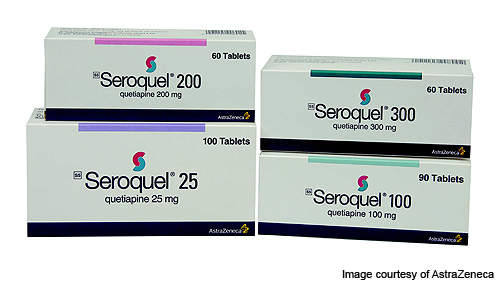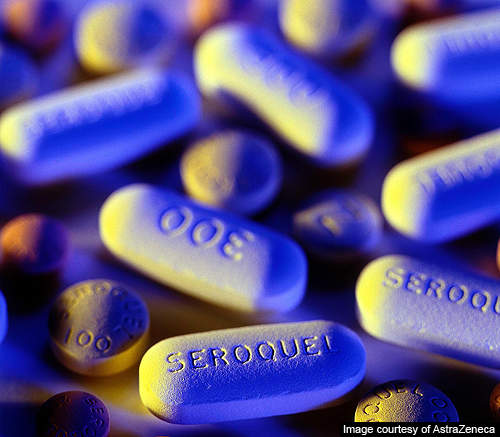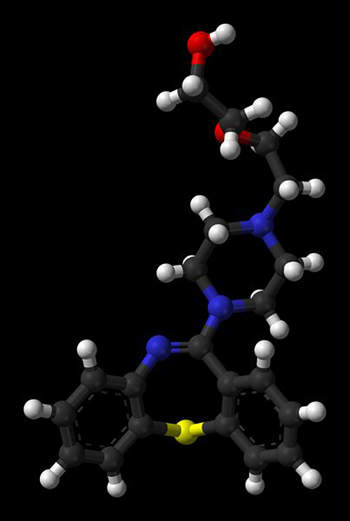Seroquel (quetiapine fumarate) is an anti-psychotic drug indicated as an add-on treatment for patients suffering from major depressive disorder (MDD). The drug was developed by AstraZeneca.
In December 2009, AstraZeneca received approval from the US Food and Drug Administration (FDA) for Seroquel to treat major depressive episodes in patients suffering from MDD. The drug received FDA approval as an add-on treatment for patients who have shown suboptimal response to antidepressant monotherapy. The drug was approved by the European Commission for the same condition in September 2010.
Seroquel also received approval from the FDA for treating adult patients with schizophrenia in 2007 and bipolar disorder in 2008.
Quetiapine fumarate belongs to the anti-psychotic class of drugs. The exact mechanism of action is unknown, but it has been proposed that it works by blocking the receptors of neurotransmitters.
AstraZeneca conducted an open-label Phase I clinical trial on Seroquel between May 2006 and January 2009. The study, conducted in Canada, enrolled 15 MDD-affected patients aged between 18 and 65.
Purpose and outcome of the study
The primary outcome measure of the study was to rate sleep quality by measuring overnight polysomnography (PSG) in both the short-term (two to four days) and long-term (21 to 28 days).
The company initiated an open-label, multicentre, non-comparative Phase II clinical trial on Seroquel in Belgium in 2006. The study was concluded in November 2007. The patients enrolled in the study were administered with 100mg, 200mg and 300mg doses of the drug for four weeks. The primary outcome was finding the score of Montgomery-Asberg Depression Scale (MADRS), a ten-item questionnaire used to measure the severity of depression. The secondary outcome measures included finding Brief Psychiatric Rating Scale (BPRS) and Sheehan Disability Scale (SDS) scores. BPRS is used to measure the severity of the symptoms of depression. SDS is a self-rated method to assess the mental impairment.
AstraZeneca conducted seven Phase III clinical trials to find out the efficacy of the drug in treating MDD patients. Phase III studies 1 to 4 were short-term monotherapy studies on Seroquel, study 5 was a long-term clinical study and clinical studies 6 and 7 were short-term adjunct therapy studies.
In the first phase III randomised and double-blind study on Seroquel, more than 446 patients were enrolled for six weeks. They were administered antidepressants and either Seroquel 150mg/day, 300mg/day doses or a placebo. The results of the study indicated that Seroquel 300mg/day used with antidepressants showed statistically improved results when compared to placebo.
723 patients were enrolled in the fifth Phase III clinical trial on Seroquel. The multicentre, randomised and double-blind clinical trial was conducted for six-weeks. The patients were administered with either Seroquel 50, 150, 300mg/day doses or placebo. The results of the study showed all Seroquel-administered groups significantly improved in the mean MADRS when compared with the placebo after six weeks of trial. The common adverse reactions identified during the trial were sedation, constipation, irritability, dry mouth and back pain.
The sixth Phase III clinical trial on Seroquel was a randomised, double-blind, time-to-event, maintenance study. It enrolled 787 patients, who were administered randomised Seroquel or a placebo with clinically adjusted doses. The results demonstrated that Seroquel reduced depression significantly when compared with the placebo. A total of 55 patients in the Seroquel group experienced depression where as in placebo group it was 132.
AstraZeneca initiated Phase IV clinical trials on the drug between May 2009 and December 2010. The six-week open-label study enrolled 30 patients in Canada. The primary out come of the study was finding the Quick Inventory of Depressive Symptomatology (QIDS), a 16-item rating used to assess the severity of depressive symptoms.
Major depressive disorder (MDD)
MDD is a mental disorder associated with low mood and self-esteem. It is caused due to the imbalance of endogenous chemicals, commonly known as neurotransmitters, in the brain. The neurotransmitters pass on signals from a neuron to a target cell across the junction (called synapse) between two neurons.
The World Health Organisation (WHO) estimates MDD affects more than 18 million people in the US alone. It is also estimated that approximately 3.4% of the MDD patients in the US commit suicide.





